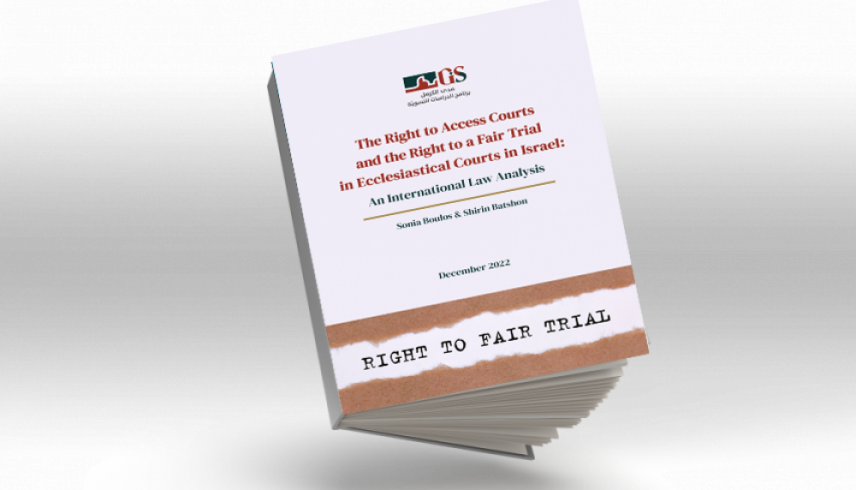
Mada al Carmel published a new research titled “The right to access courts and the right to fair trial in the ecclesiastical courts in Israel: an international law analysis”, authored by Dr. Sonia Boulos, a senior Lecturer at the Faculty of Law and International Relations at the University of Nebrija (Spain) and a board member at Mada al Carmel and Shirin Batshon, attorney and legal researcher in the field of advancing human rights and gender equality.
The research focuses on the right to access courts and the right to a fair trial, which constitute central tenets of international human rights law. The authors believe that the focus on the right to a fair trial exposes another dimension of the disfranchisement of Palestinian citizens in Israel, and it suggests that imposition of an illiberal family law regime on them resonates with the millet system perception of minorities as mere subjects. The scarce literature that exists on Ecclesiastical courts in Israel pays little attention to due process guarantees, therefore, this research attempts to close the gap. The research is based on a qualitative methodology that includes conducting semi-structured interviews with a group of leading lawyers in the field of family law applicable to Christian citizens and with judges and officials from Ecclesiastical Courts; it also includes document analysis regarding procedural and substantive norms applicable to these courts from an international law perspective.
The research focused on the five largest recognized Christian communities and their respective courts: The Greek-Orthodox courts; the Latin (Roman Catholic) courts; the Greek-Catholic Melkite courts (hereinafter Melkite courts); the Maronite courts; and the Evangelical Episcopal courts.
This initial report on the outcomes of the research project is structured as follows: The first part surveys the laws that regulate the work of Ecclesiastical courts in Israel; the second part surveys international human rights standards on the right to a fair trial and the right to access courts; and the third part presents the methodology of this research and its findings. Beyond analyzing the compatibility of the praxis of Ecclesiastical court with international human rights standards on the right to access courts and the right to due process, this report attempts to incorporate an “implementation-oriented” approach to help rectify the deficiencies that exist.
The outcomes of this research suggest that the State of Israel has failed in guaranteeing the right to a fair trial for Palestinian Christian litigants in the ambit of family law. Almost all the components of the right to a fair trial, as set forth by international law, are not respected, due to Israel’s failure to act in accordance with international law. The outcomes of this research expose another dimension of the disfranchisement of Palestinian citizens in Israel, and they suggest that imposition of this illiberal and coercive family law regime goes deeper than fragmenting and controlling them, it also resonates with the millet system’s perception of minorities as mere subjects and not as citizens with equal rights.
While the responsibility to guarantee that Palestinian Christian litigants are treated as equal citizens falls primarily on the State, church institutions entrusted to exercise judicial powers also have the duty to respect and fulfil Israel’s obligations under international law. The full autonomy of Ecclesiastical courts from all branches of power in Israel cannot be construed as an autonomy from the international legal order and from international human rights treaties binding Israel. Therefore, Ecclesiastical courts are encouraged to adopt a variety of necessary and urgent measures to meet their own obligations under international law. Those include, but are not limited to: appointing women to the bench; remunerating judges for their work; separating the judicial functions of judges from their spiritual ones; establishing public committees for the appointment of judges with a gender-balanced participation of lay persons; enhancing the competency of judges by organizing training on Israeli law; publishing leading case-law while preserving the privacy of the parties; enhancing the adversarial character of their proceedings; allowing individual and minority opinions; guaranteeing economic and physical accessibility to courts; and operating websites that can provide comprehensive information for litigants including Arabic translation of Canon law.
It should be noted that the study was published in both Arabic and English.
To read the Publication in Arabic, Click here
To read the Publication in English, Click here